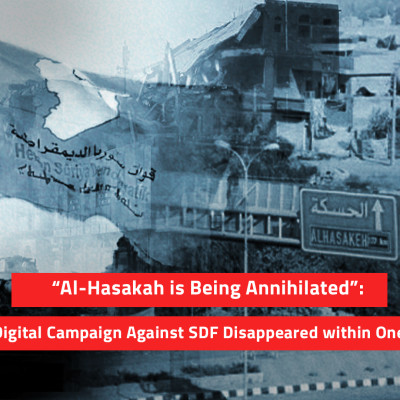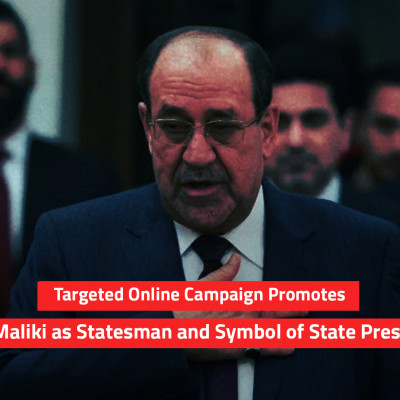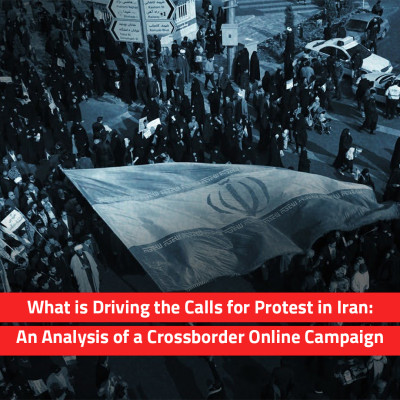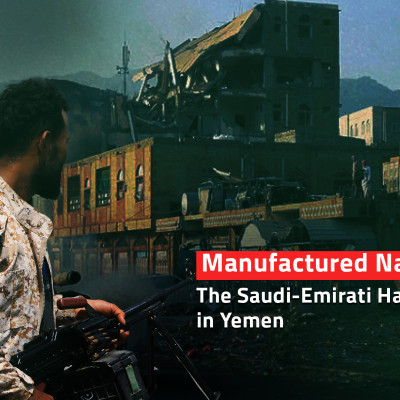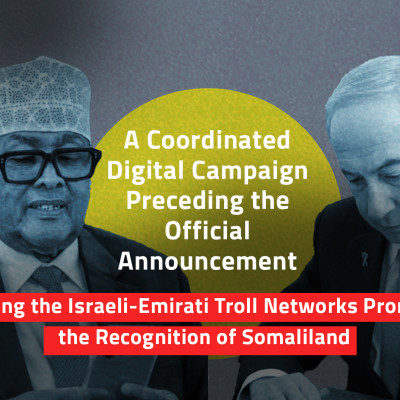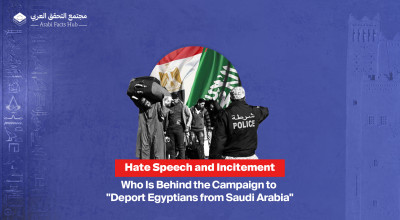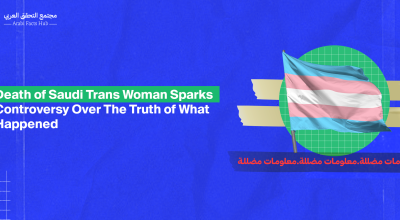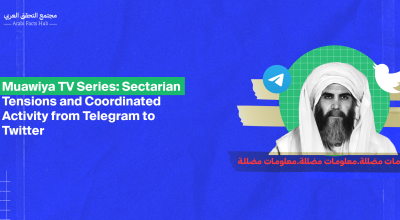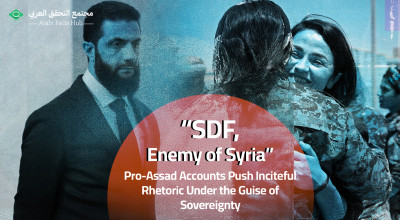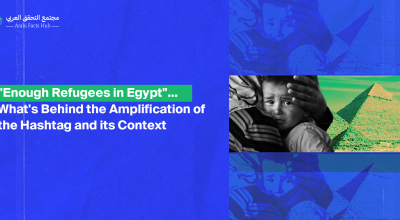Moroccan and Algerian Accounts Lead Disinformation Campaign at the Backdrop of Gen Z Protests in Morocco
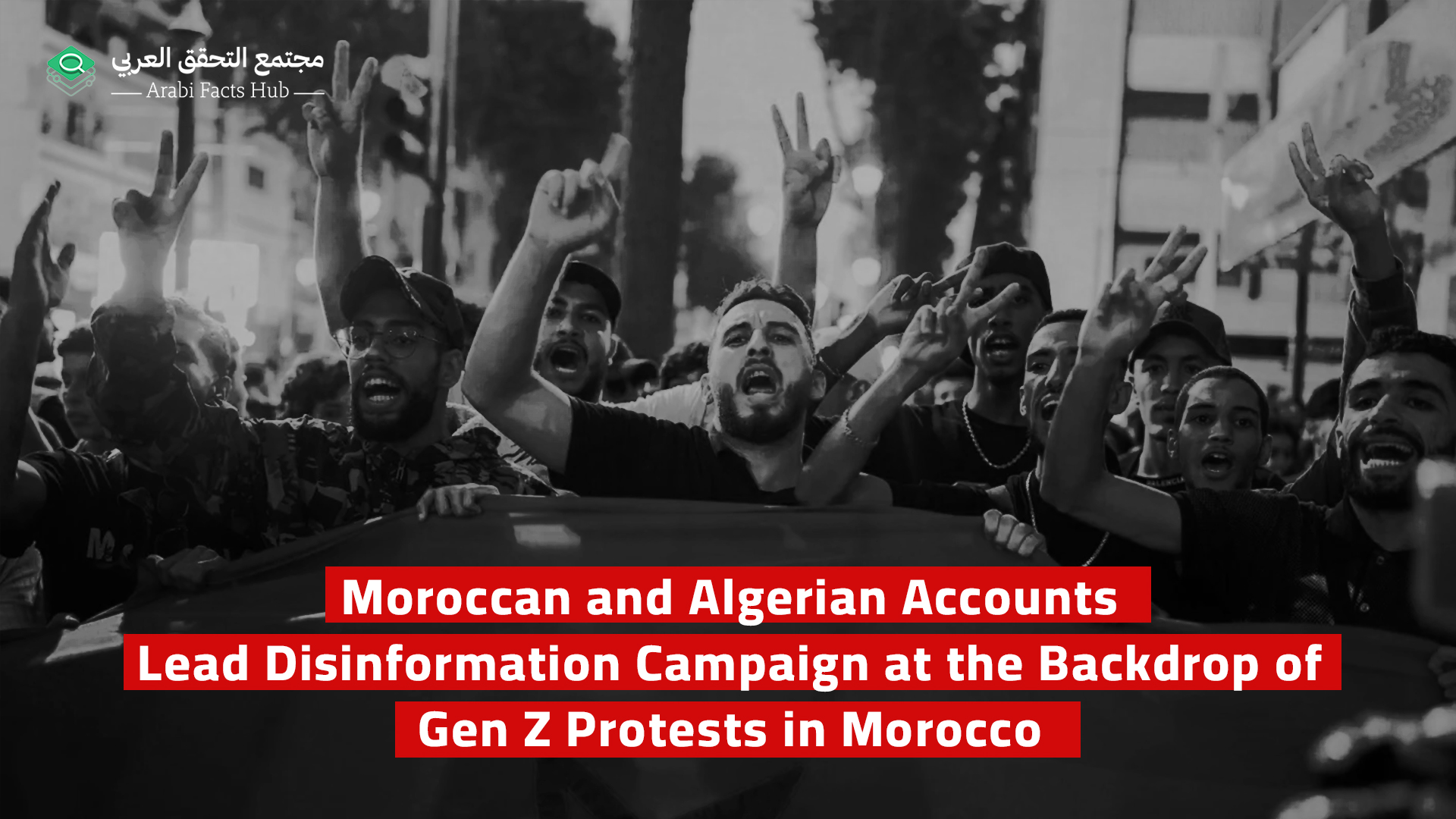
Ibrahim Hilal
On September 27, 2025, demonstrations erupted across several Moroccan cities, driven largely by decentralized groups of Gen Z youth. Protesters called for better education and healthcare, while criticizing government spending on international sporting events, including the 2025 Africa Cup of Nations and preparations for the 2030 World Cup. The rallies also reflected deep frustration over worsening economic conditions and the declining quality of public services.
The protests began in Rabat, Marrakesh, and Casablanca before spreading further. As security forces cracked down on participants, tensions escalated, leading to clashes and confrontations between demonstrators and Moroccan authorities.
This scene was mirrored online with the spread of the hashtag #المغرب_ينتفض (Morocco Rises) across social media platforms. In response, pro-regime hashtags appeared, such as #المغرب_أولا (Morocco First), #المملكة_المغربية_الشريفة (Honorable Moroccan Kingdom), #الملك_محمد_السادس (King Mohammed VI), and #المغرب_مملكة_العز (Morocco Kingdom of ` Pride).
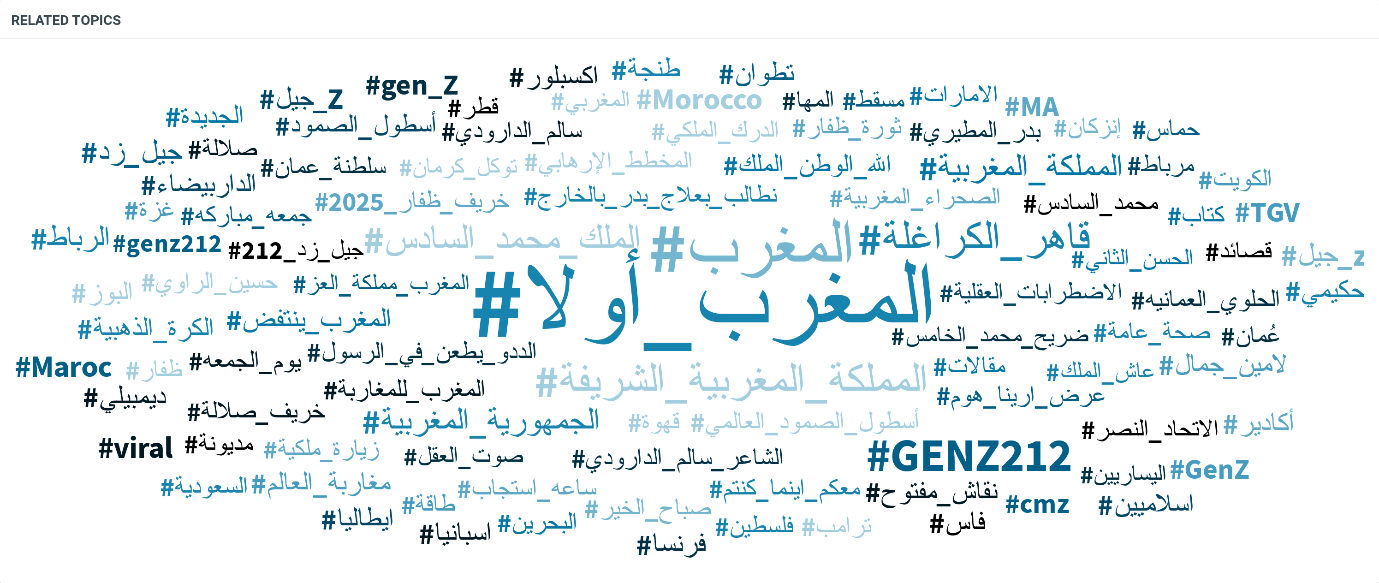
This points to a systematic propaganda campaign on social media platforms, through which accounts linked to the ruling regime actively spread misleading news and steer public opinion in favor of the official narrative.
A Coordinated Propaganda Campaign to Counter the Moroccan Uprising
In the first week of October 2025, as protests intensified across Moroccan cities, there was a surge in the use of hashtags which uniformly advocated for supporting the ruling regime and safeguarding Morocco from instability.

The number of posts associated with these hashtags reached approximately 12,800 during the week of protests, but they achieved virality many times their number; the total reach of the posts increased to nearly 106 million times in one week.


The campaign's initial peak occurred on October 1, between 7 and 8 PM. This coincided with a surge in protests advocating for better education and healthcare, which led to violent clashes with security forces in cities like Oujda and Ansejane.

Concurrently, accounts based in Morocco and Saudi Arabia contributed to the dissemination of several widely shared and interactive posts that cautioned against protests and unrest. A second surge in activity was observed on the evening of October 2nd, during which posts emphasized Morocco's political stability and highlighted the widespread popular support for the ruling regime.
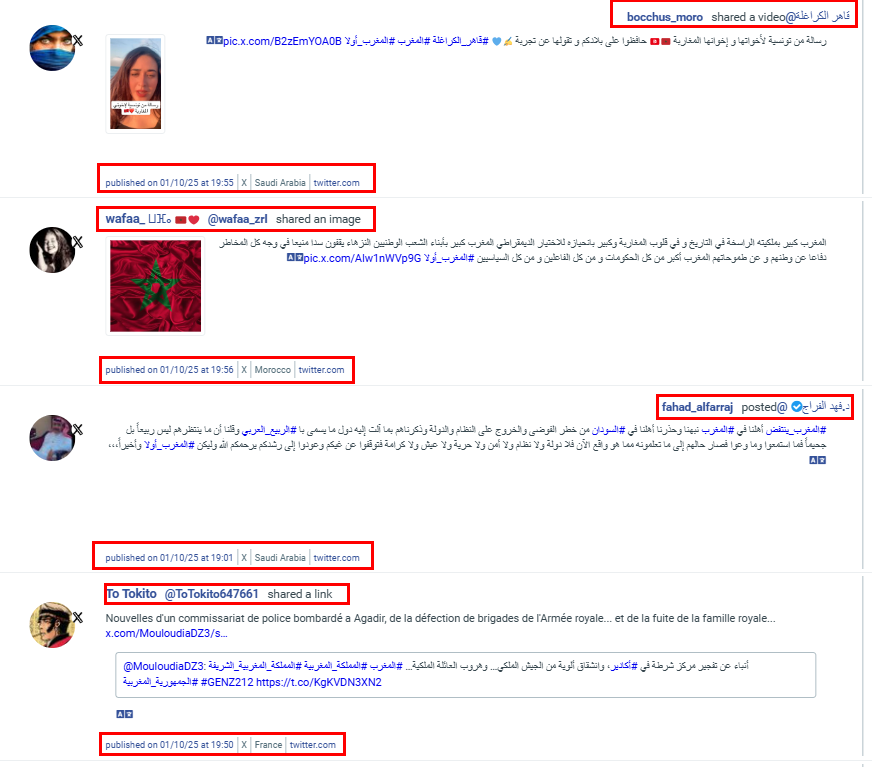
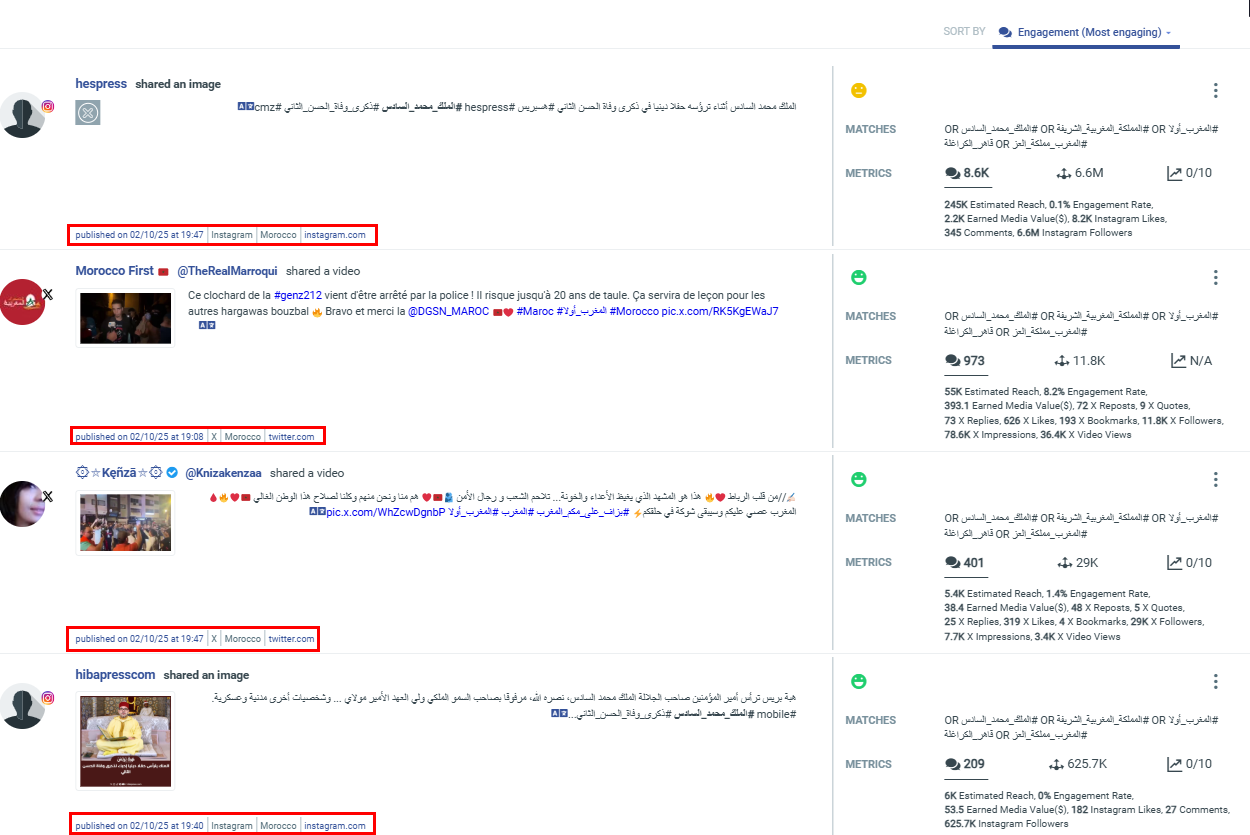
Despite the events occurring in Morocco, only about 38% of the total posts originated from the country. This was the highest percentage, followed by Saudi Arabia at 19.2%, France at 12.8%, and Algeria at 7.5%.
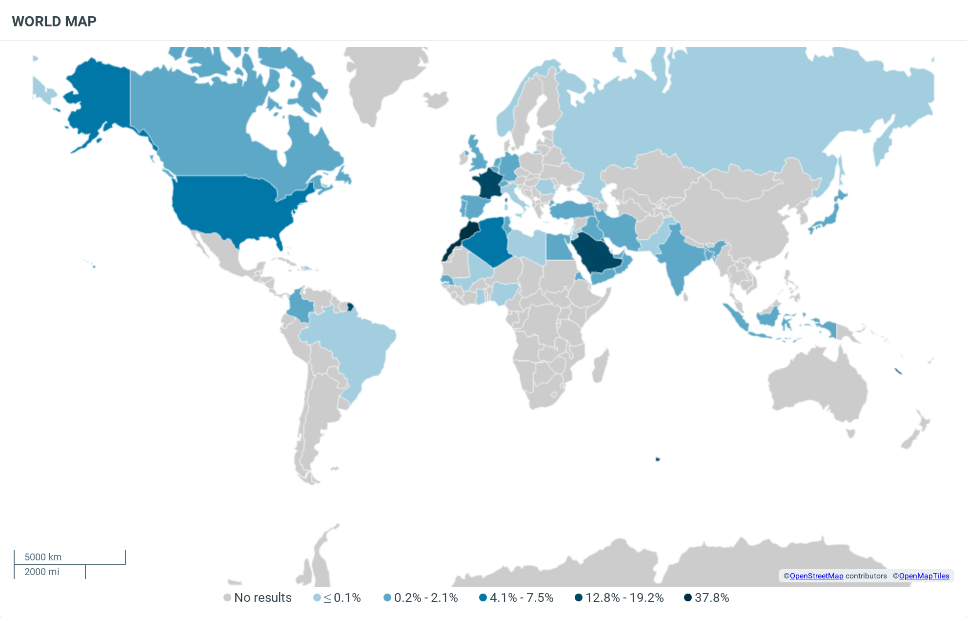
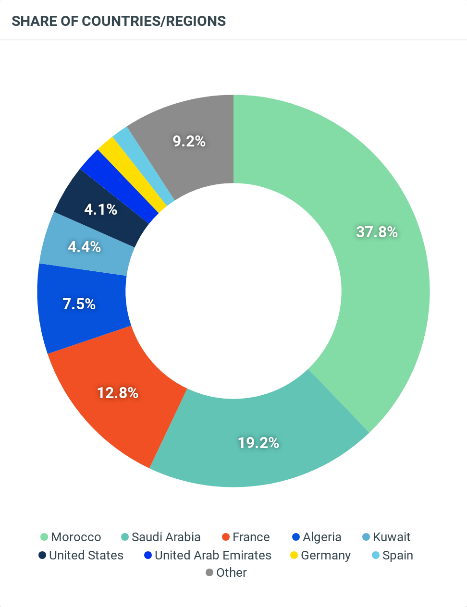
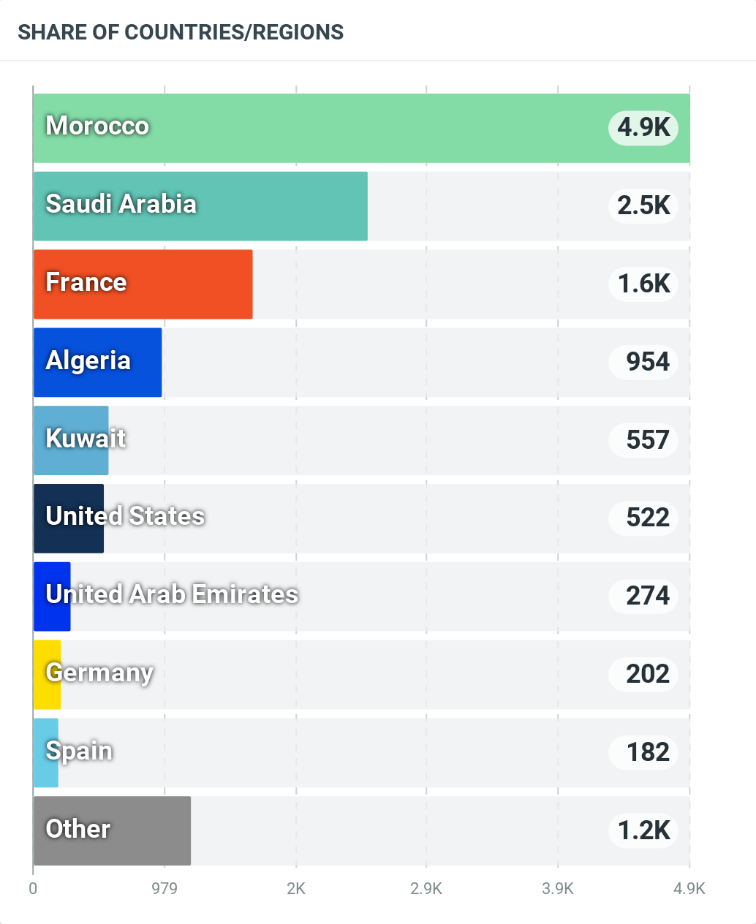
Most Active Accounts in the Campaign
In a one-week period, the campaign involved only 988 accounts. However, these accounts were highly active, generating approximately 13,000 posts. Our data extraction and analysis revealed a list of the most interactive accounts based on the volume of their posts.
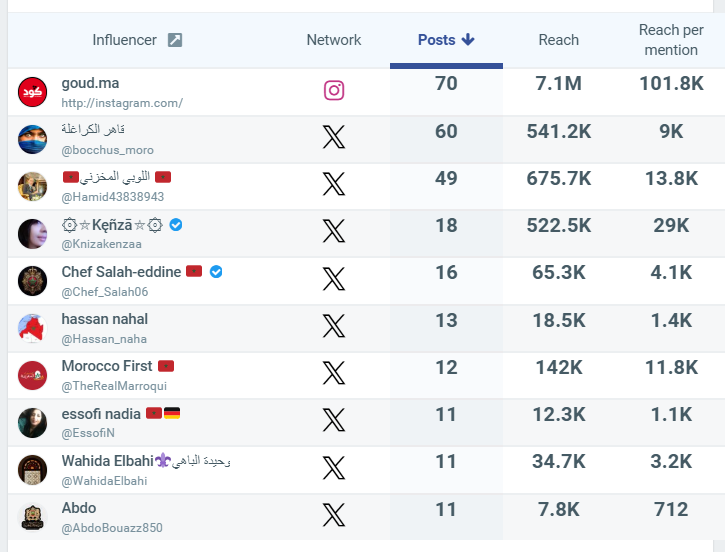
The goud.ma account on Instagram topped the list, publishing 70 posts that included one of the hashtags focused on by the research. The account belongs to the electronic newspaper "Goud", which provided diverse coverage of the protests in Morocco.
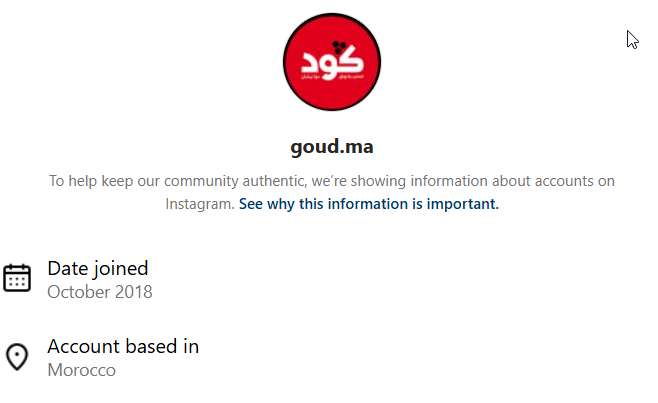
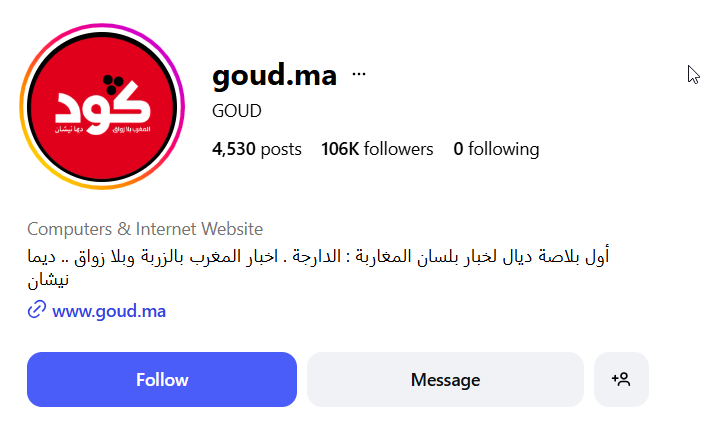
Further investigation into the website's domain revealed its registration on July 4, 2024, in Morocco under the name Ahmed Najim, with his email and phone number publicly listed. However, a cross-reference of the phone number showed it to be registered under the name "Jaridat Goud."
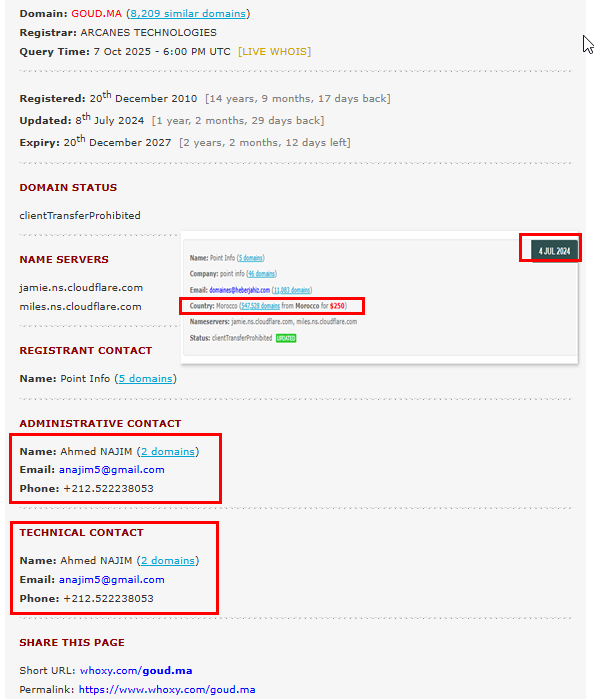
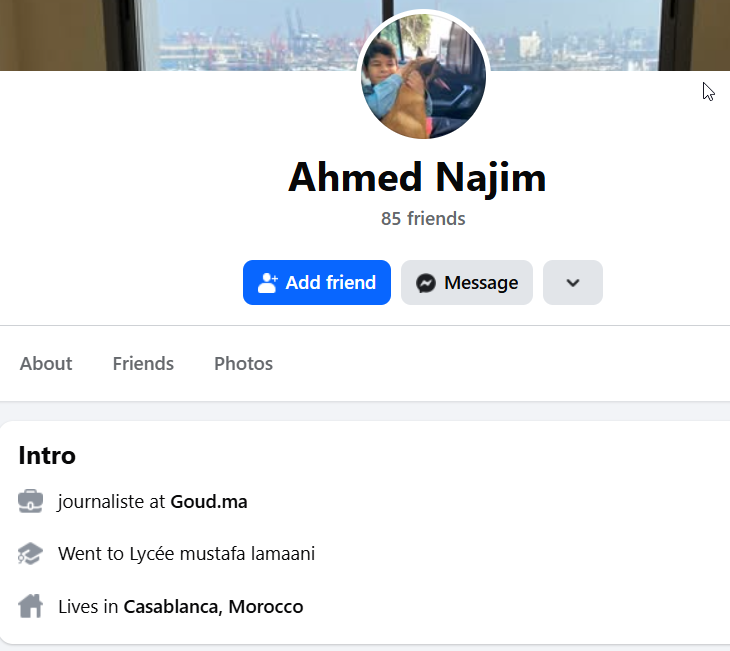
Next in the ranking is an account on X under the name “Conqueror of the Karaghla” (@bocchus_moro). The term “Karaghla” is a historical expression used to describe groups in Algeria, Libya, and Tunisia of mixed ancestry, originating from marriages between Ottoman soldiers and North African women. Today, Moroccan accounts use the term as a derogatory label against Algerians.
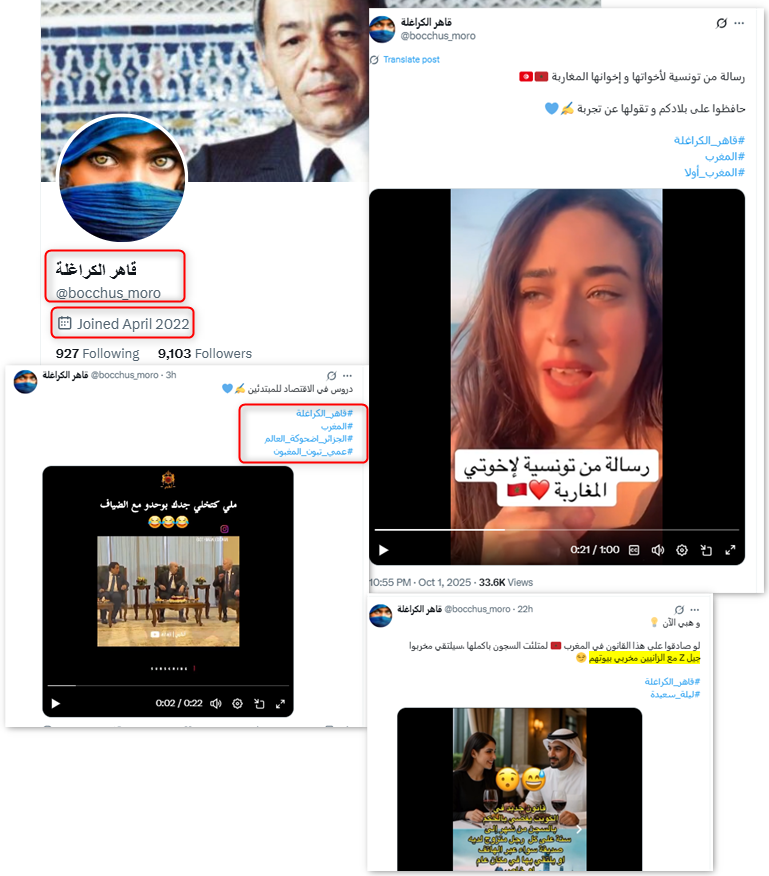
Although the "Conqueror of the Karaghla" account appears at first glance to be a Moroccan account, an analysis of its activity showed that it is managed from Saudi Arabia. The account published about 60 posts focusing on supporting the ruling regime in Morocco, in addition to attacking and mocking Algeria.
In a previous report by Arabi Facts Hub that addressed an online war between Algeria and Morocco, this account was observed to employ hate speech targeting Algerians. More recently, it has engaged in incitement, using insults and defamation against protesters during recent events.
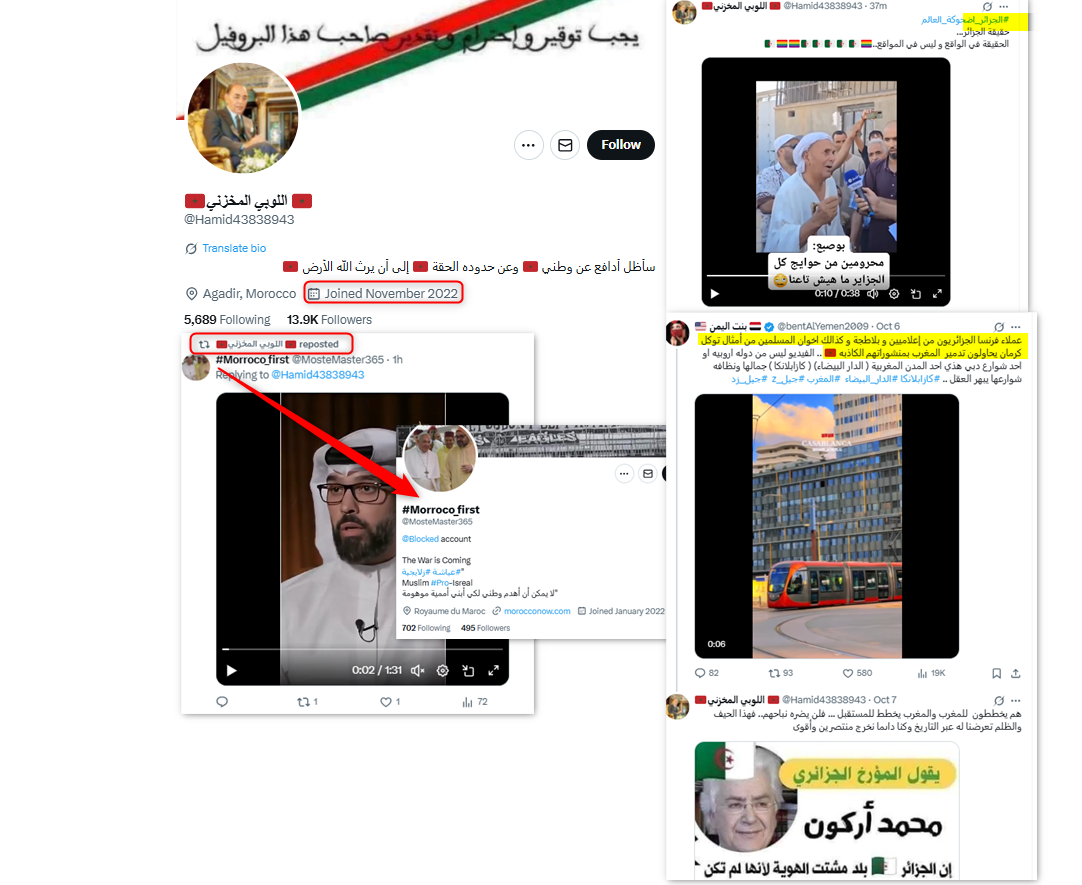
Next on the list was the account “Makhzen Lobby” (@Hamid43838943), with 49 posts. This account is also active in attacking Algeria through the hashtag #الجزائر_أضحوكة_العالم (Algeria the Laughingstock of the World). The account also shows frequent interaction with the user @MosteMaster365, who identifies himself as a supporter of Israel.
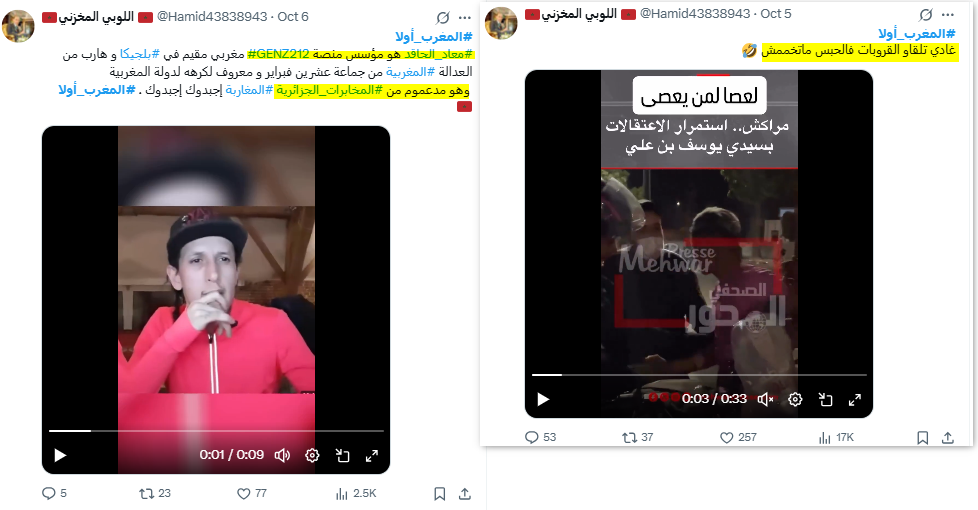
The "Makhzen Lobby" account accuses Algeria of supporting the protesters in Morocco, and also published that the founder of the #GENZ212 platform is the rapper "Moad Al Haqed", which the movement denied in an official statement, but the news was nothing more than part of the incitement discourse adopted by the account against any opponents of the ruling regime in Morocco.
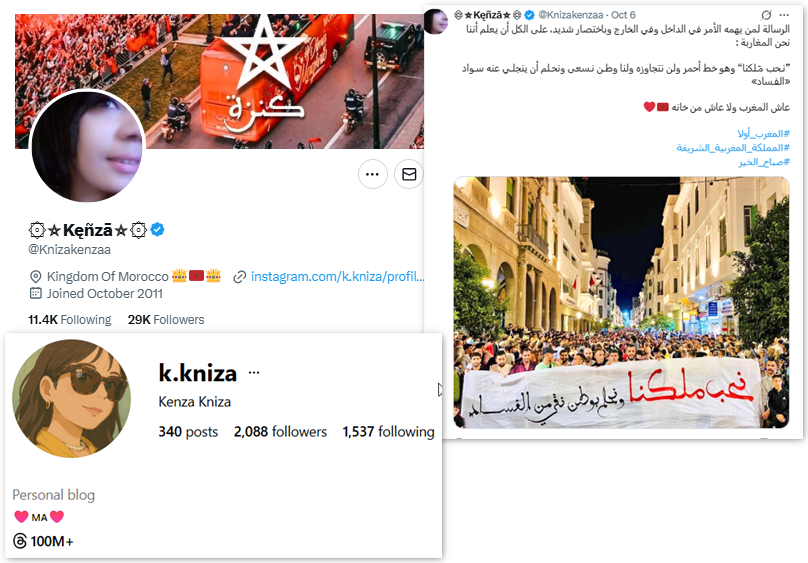
In fourth place on the list of most interactive accounts was "۞⛥Kęñzā⛥۞" (@Knizakenzaa), a relatively old Moroccan account that does not publish any personal content. All its posts focus on political propaganda and repeated support for the ruling regime in Morocco.
The same pattern applies to its associated Instagram account, where no personal photos were observed, even though the account identifies itself as a personal account.
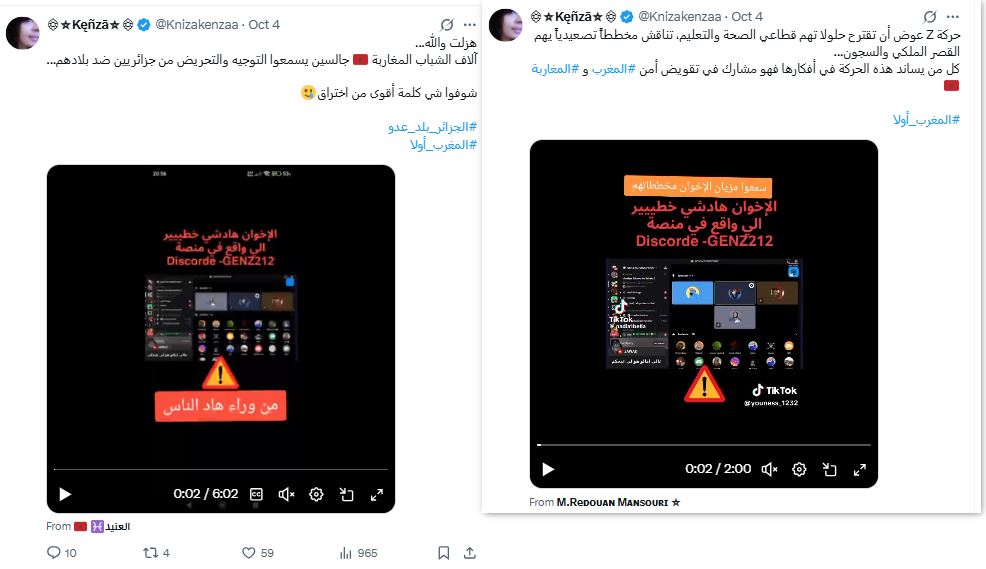
The "@Knizakenzaa" account repeatedly accuses Algeria of conspiring against the Moroccan regime. It reposted content accusing protesters of resorting to mercenaries who train them in "peaceful overthrow of regimes."
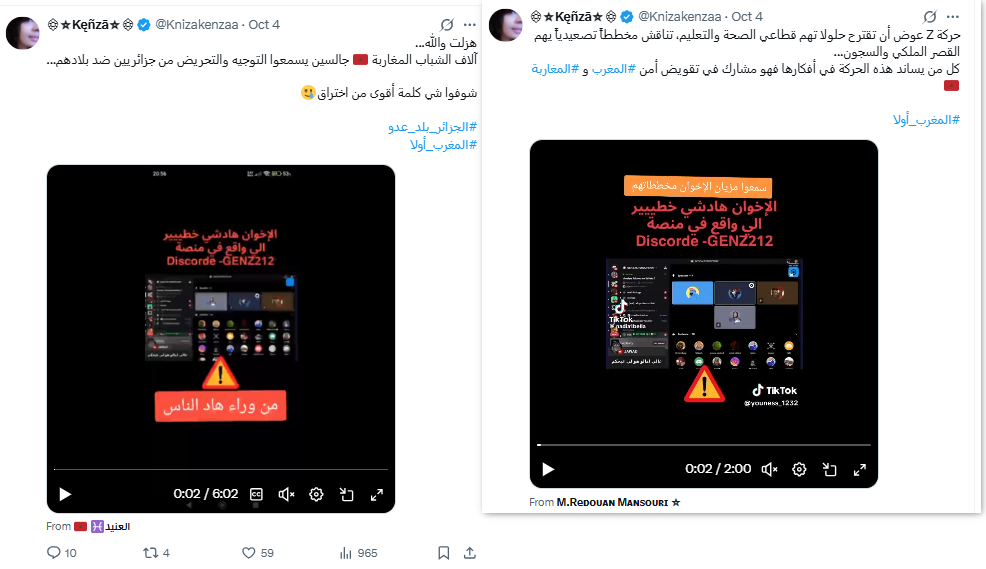
The account also published audio clips within the GENZ212 group on DISCORD, claiming that the group is directed by Algerians, which is incorrect. A review of the audio transcript of the clip showed that the dialect used is Moroccan Darija and not Algerian, as evidenced by the use of words such as: "Makhzen" (the state or regime), "daba" (now), "ayacha" (supporters of the king), and "wash" (meaning "is it?"). These are all Moroccan Darija expressions.
In addition, the grammatical structure and phrasing used in the posts — including expressions like “ghir ykhrj w yṣīd f en-nas” (“he just goes out and picks on people”), “wash bik” (“what’s wrong with you?”), and “khṣ irshad” (“needs guidance”) — perfectly match Moroccan Darija, which refutes the claim that the account is not Moroccan.
As for the allegation that the protesters are from the Muslim Brotherhood, there is no evidence to substantiate that claim.
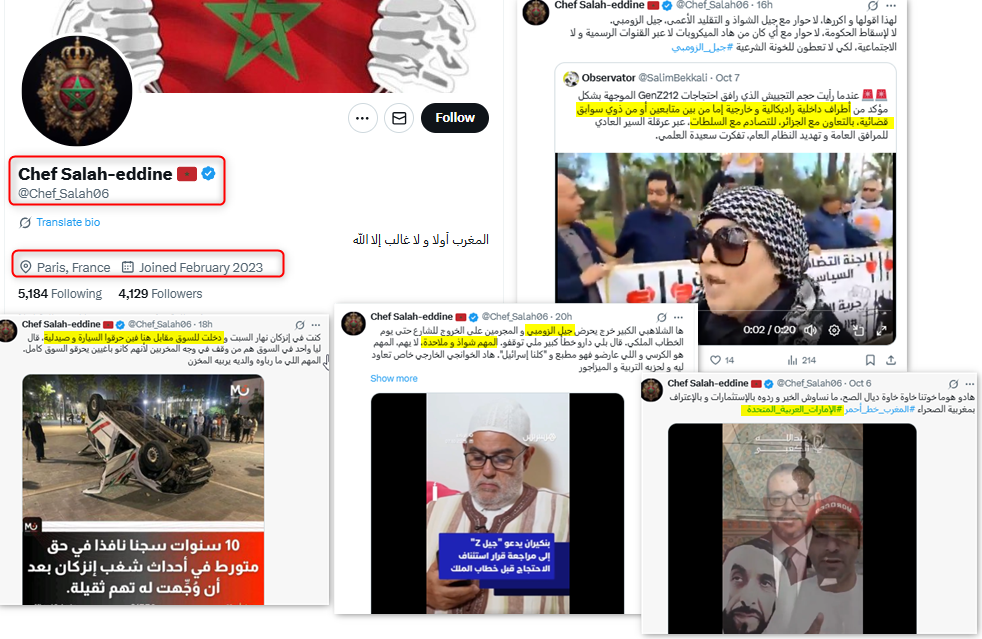
The "Chef Salah-eddine" account, despite being located in Paris, France, mirrored the narrative of other accounts. It reiterated accusations of "the conspiracy of Algeria and the Muslim Brotherhood against Morocco" and also included a tweet expressing gratitude to the UAE. This pattern prompted our investigation into the narratives promoted by accounts from the various countries identified on the interaction map.
Accounts Defending the Moroccan Regime
Using Talkwalker, we were able to identify the most frequently used keywords in a specific country. When we selected Morocco, it became clear that the most commonly used and repeated words reflected the dominant or prevailing narrative in the country. This allowed us to clearly observe the use of hashtags such as #المغرب_أولا (Morocco First) and #الملك_محمد_السادس (King Mohammed VI) as forms of support and promotion for the ruling regime in Morocco.
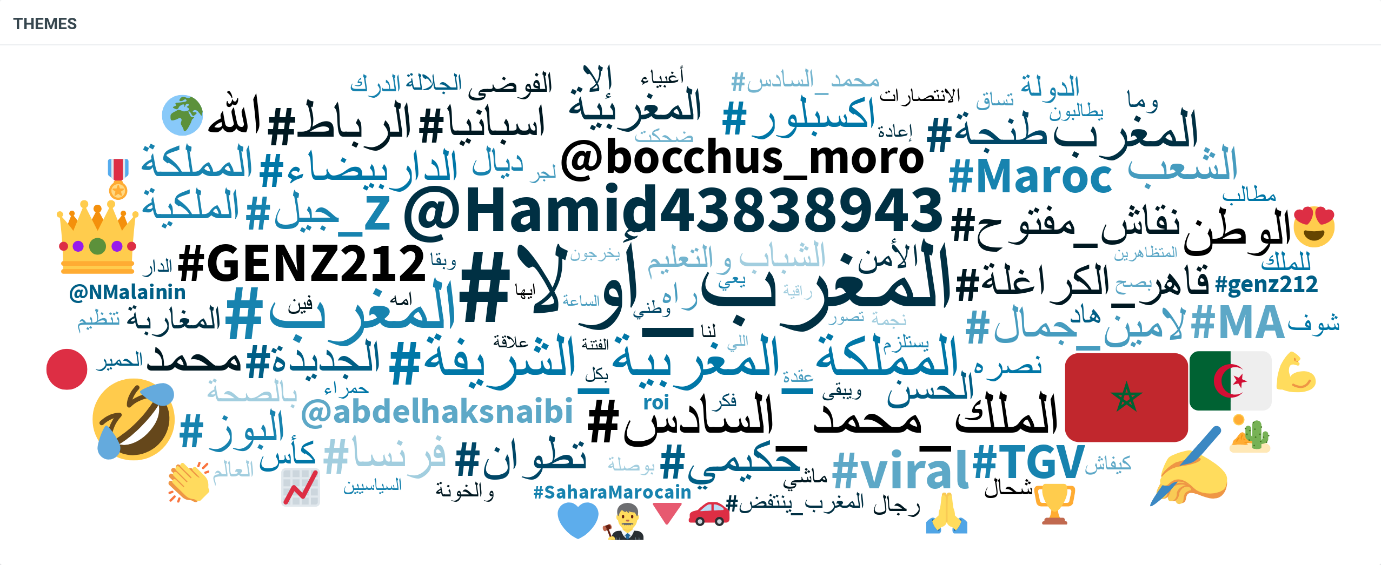
Hashtags such as #قاهر_الكراغلة (Conqueror of the Karaghla) also stood out, reflecting the presence of Algeria as the primary party accused of conspiring against Morocco within the prevailing discourse. Both the “Conqueror of the Karaghla” account and the “Makhzen Lobby” account—previously discussed—appeared among the most active accounts engaging with these hashtags, as well as among the leading promoters of the pro-government narrative in Morocco, which accuses protesters of conspiracy, incitement, and sabotage.
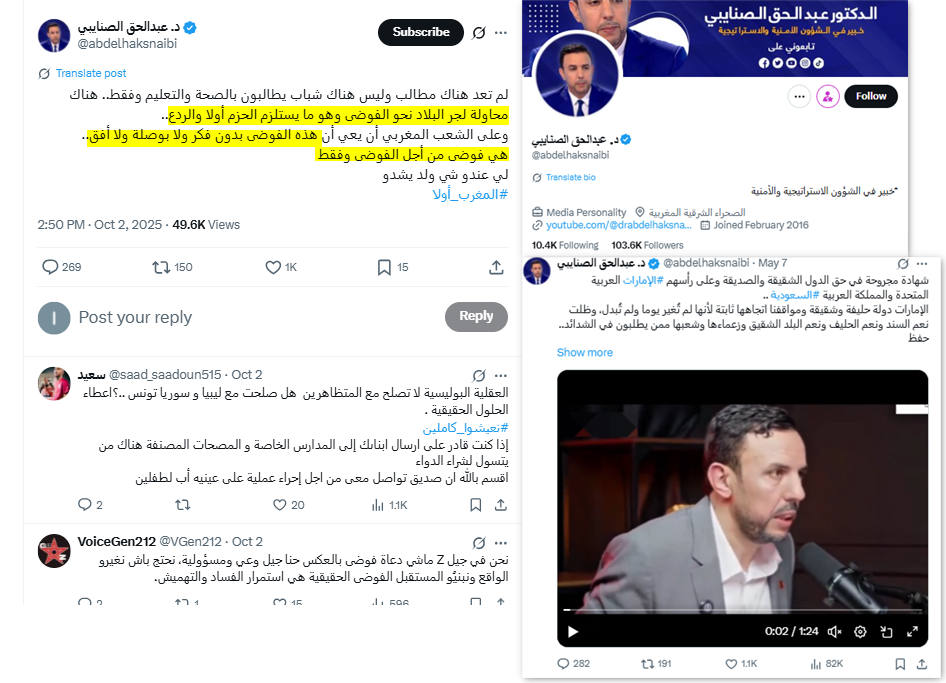
This narrative was not only linked to anonymous accounts but also to an account under the name "Dr. Abdelhak Snaibi," who identifies himself as an "expert in strategic and security affairs."
Snaibi has worked in several think tanks and academic institutions, including: المؤمنون بلا حدود (Believers Without Borders), the European Centre for Counter-Terrorism and Intelligence Studies, and the Arab Democratic Center.
In his media appearances, Snaibi clearly expresses his support for the ruling regime in Morocco and also declares his support for the normalization of relations between Morocco and Israel. He mentions on his account that he currently holds the position of director of the "Tamghrabit" website.
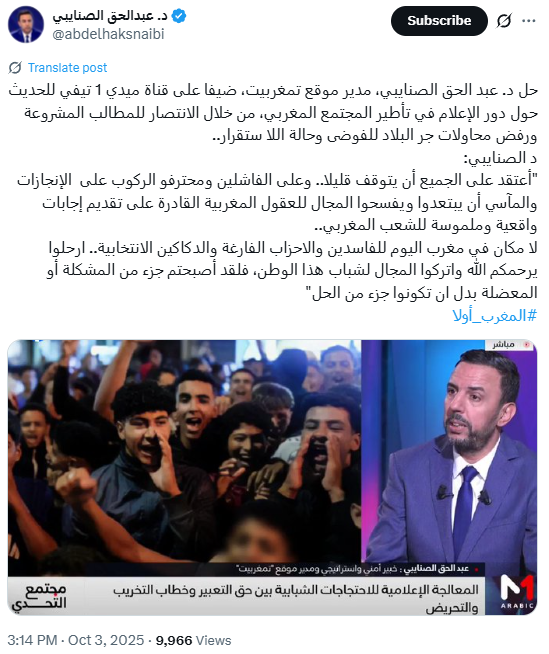
Saudi Narrative in Support of the Moroccan Regime
The word cloud of the most frequently used terms in Saudi Arabia clearly reflected support for the same narrative promoted by Moroccan accounts. The username of the “Conqueror of the Karaghla” account—operated from Saudi Arabia—appeared prominently, along with the hashtag #قاهر_الكراغلة (Conqueror of the Karaghla), which is primarily directed against Algerians.
This indicates that the same claims about “Algeria conspiring against Morocco” were being promoted within the Saudi digital space.
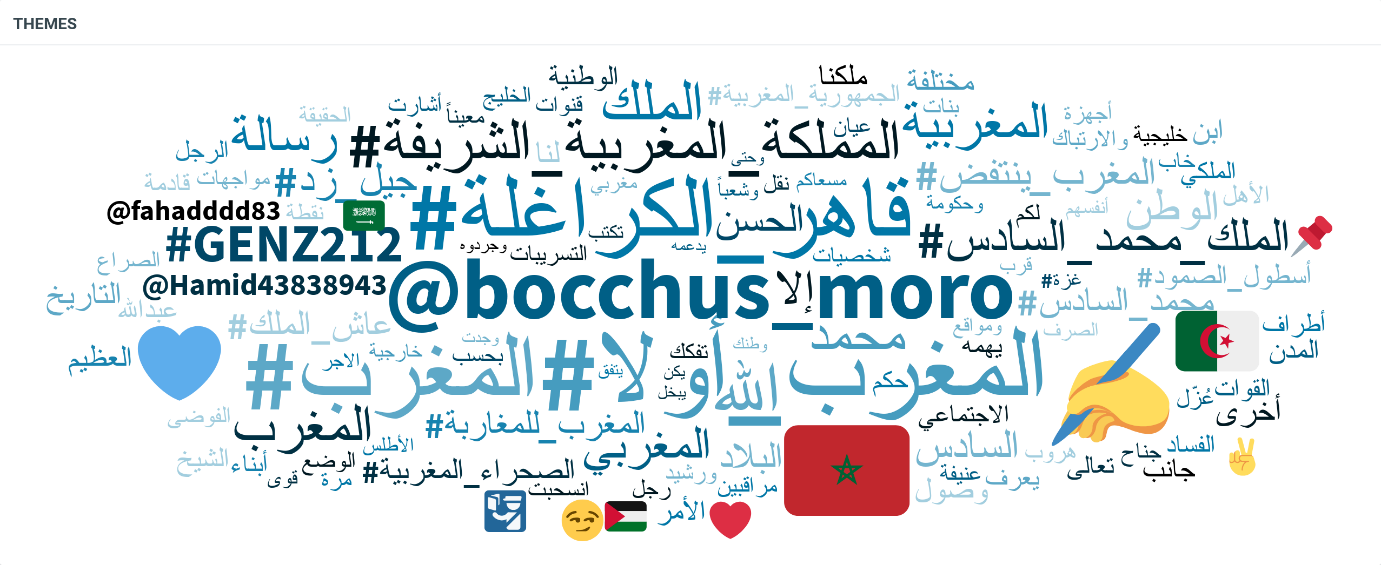
The word cloud also shows the presence of several hashtags supporting the ruling regime in Morocco, such as #المغرب_أولا (Morocco First), #الملك_محمد_السادس (King Mohammed VI), and #المملكة_المغربية_الشريفة (The Honourable Moroccan Kingdom).
Alongside these, the usernames of the accounts “Makhzen Lobby” and @fahadddd83 “Fahad (Ikhwan Maryam)” stand out, both among the most active in engaging with these hashtags and promoting pro-regime content in support of the Moroccan government.
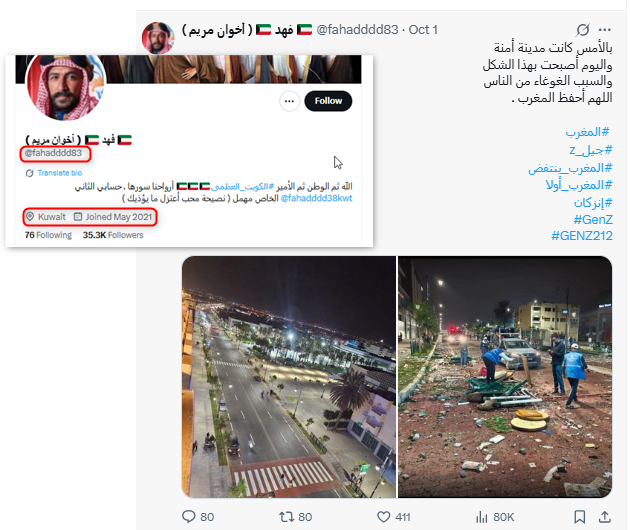
"Fahd (Ikhwan Maryam)" operates as a Kuwaiti account created in 2021. It published a widely circulated tweet describing the protestors as a mob and accusing them of vandalism.
These same accusations were repeated by the "Abdulkarim Al ‘Awad" (@krim237) account, a Saudi account that re-published claims about the involvement of "dirty foreign hands" in the Moroccan protests.
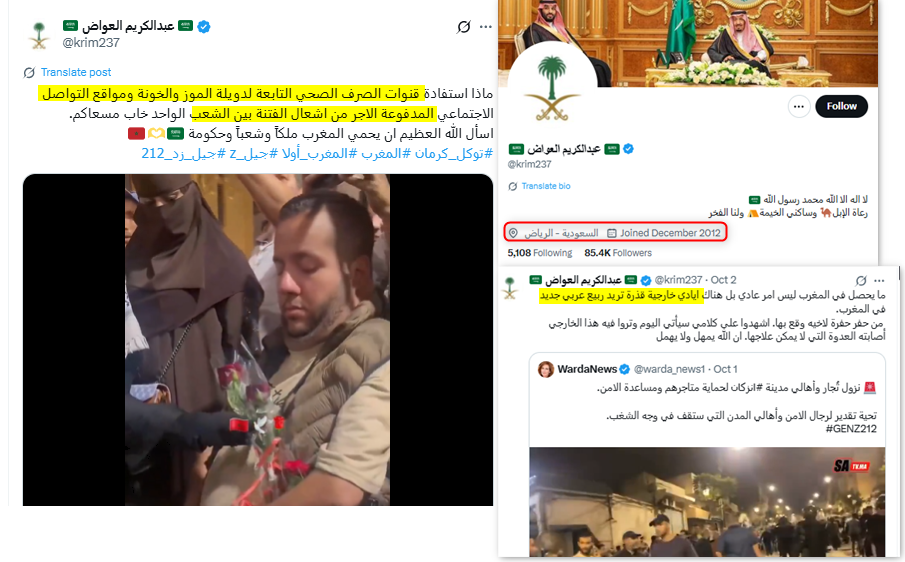
Just as the “Abdelkarim Al ‘Awad” account warned of "dirty foreign hands" that want "a new Arab Spring", "Dr. Fahd Al Farraj" reiterated the same warning, describing the outcomes of the protests as "hell " and "chaos ". Subsequently, other accounts repeated these same claims and warnings.

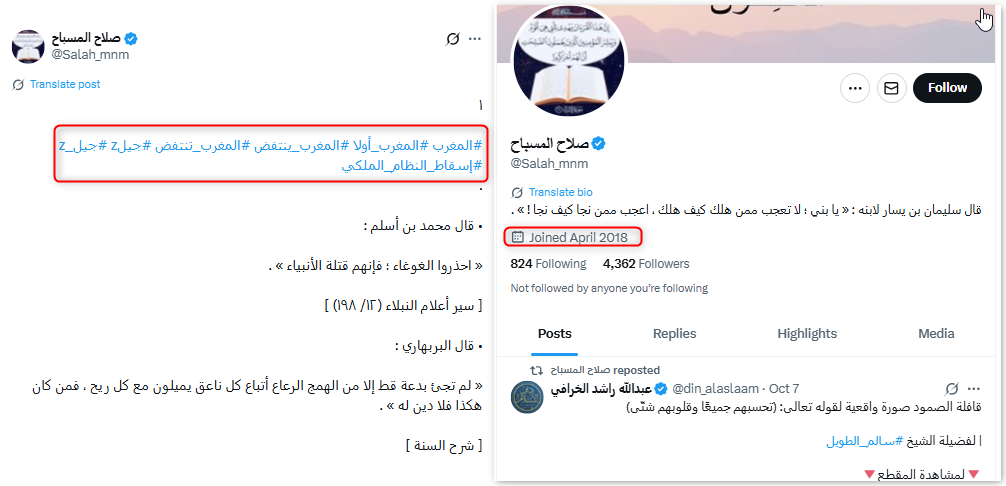
The "Salka ASWILKAT" account accused the Justice and Charity Group (Muslim Brotherhood affiliation) of opportunistically exploiting events to spread its agenda, which is “full of populism and nostalgia for a reactionary project.”
The account's posts focused on accusing the group of mobilizing and exploiting youth, describing it as an extremist group.
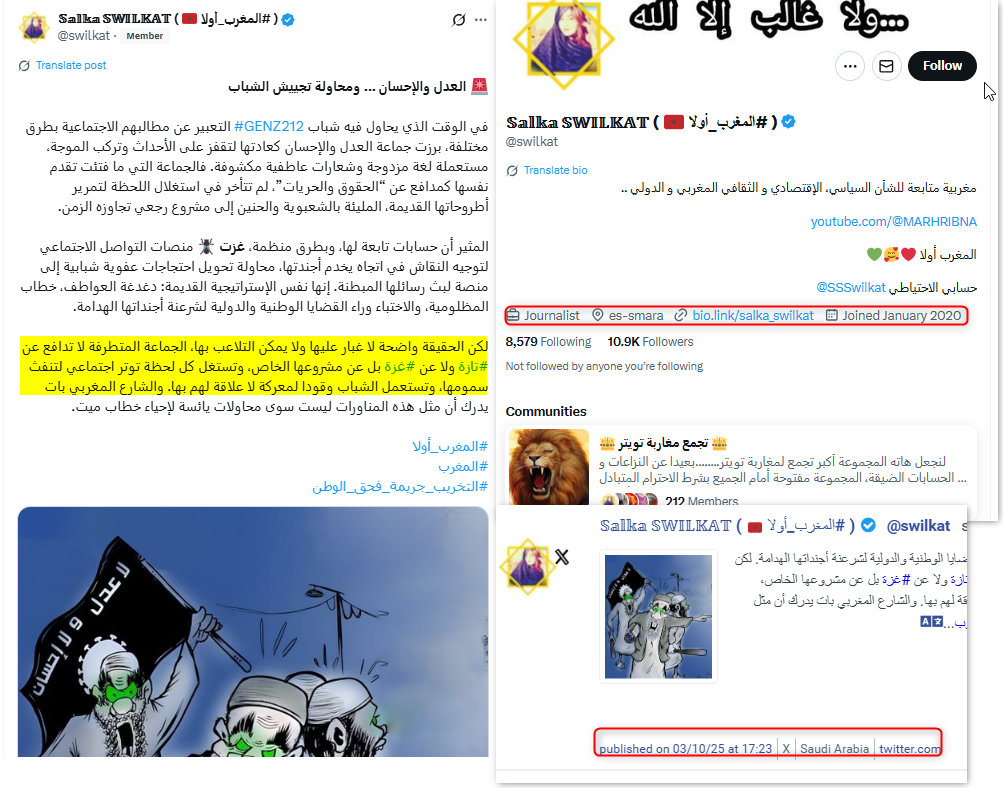
The account "Sultan Al Sharjan 2" is a recent Moroccan account created in 2024 and managed from Saudi Arabia. Its activity has focused on supporting the Moroccan king and continuously interacting with tweets supportive of the ruling regime in Morocco, in addition to anti-Algerian content.
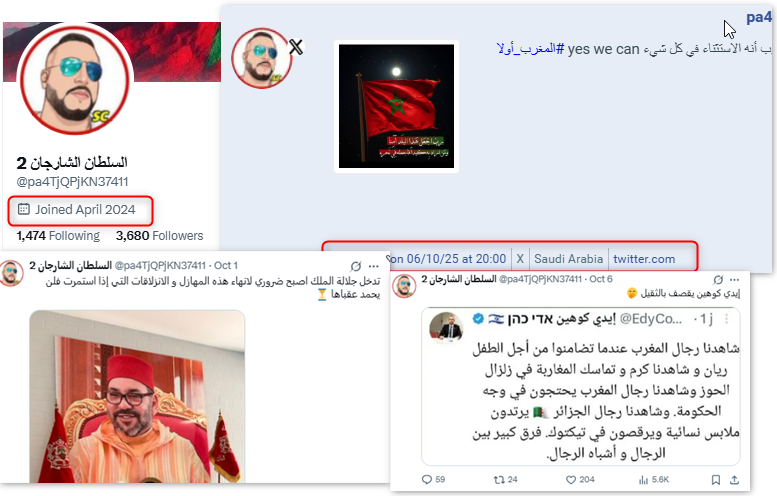
Conversely, the "Fouad Kawthar" account, previously examined in our "Free Masked Movement" investigation, presented a conflicting narrative. This account concentrated on disseminating news about the protests, citing Algerian sources that asserted Moroccan security forces had retreated or been overcome by protesters. This divergence prompted us to investigate the nature of the content published by certain Algerian accounts concerning the protests in Morocco.
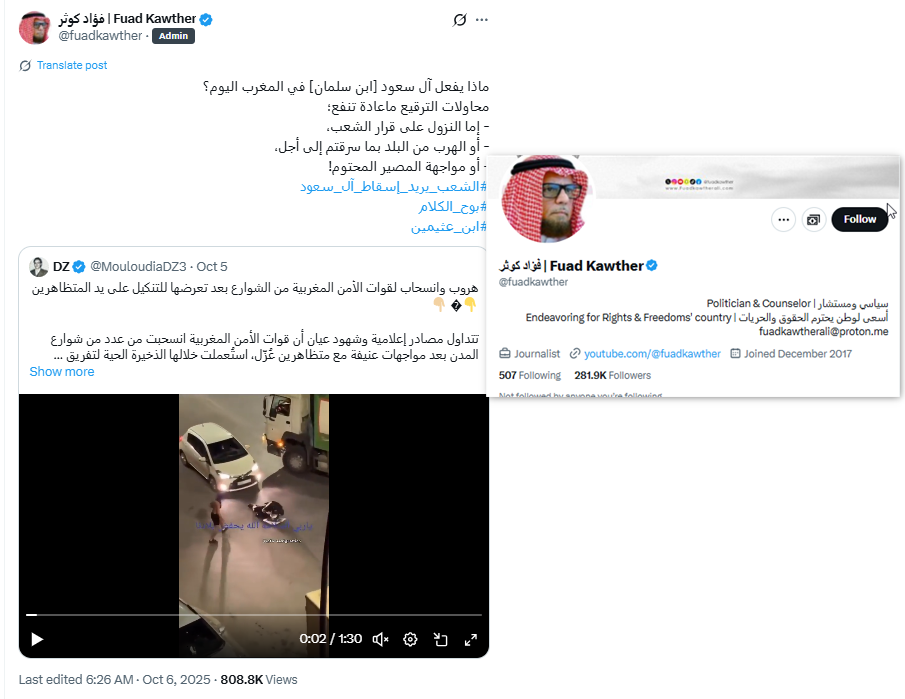
Algerian Accounts Spread a Counter Narrative
Algerian accounts promoted a counter-narrative, evident in the most frequently used terms such as "divisions," "isolated," "retreat," "escape," "conflict," and "disintegration." These terms were employed to push claims that depicted Morocco as experiencing internal strife and divisions.
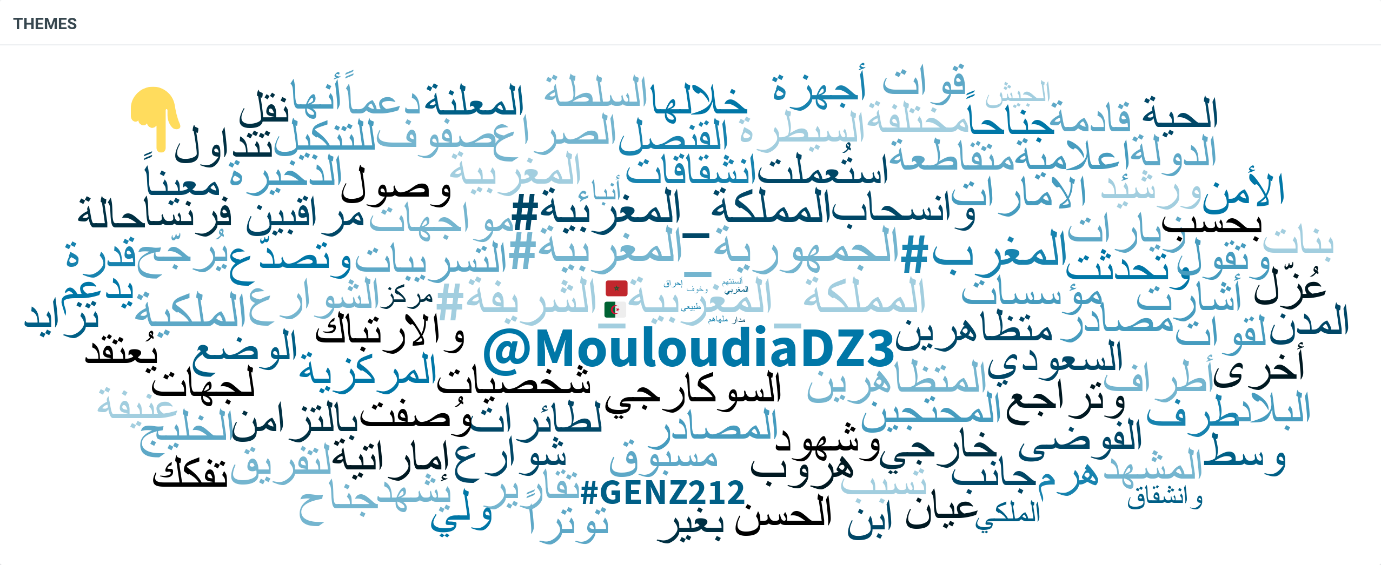
Among the most prominent of these accounts is "DZ @MouloudiaDZ3", a recent Algerian account that focused its posts on spreading news about the defeat and collapse of Moroccan security forces, the disintegration of state institutions, and the occurrence of defections within the Royal Forces, all claims that have not been confirmed and for which we found no evidence.
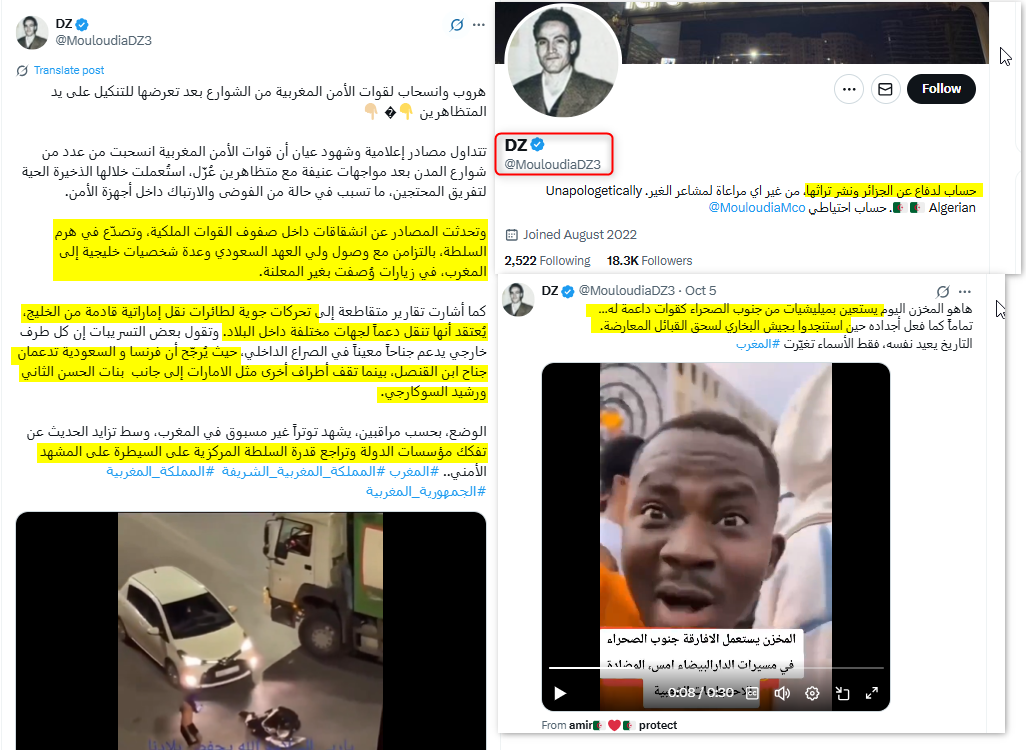
The account also published a tweet including a video clip showing some Africans chanting for King Mohammed VI, claiming that these constitute "militias" used by the regime as supporting forces.
However, a reverse image search revealed the clip to be old, dating back to September 9. It showed fans from Guinea who traveled to Morocco to support their national team in a match against Algeria, and is unrelated to the recent youth protests in Morocco.
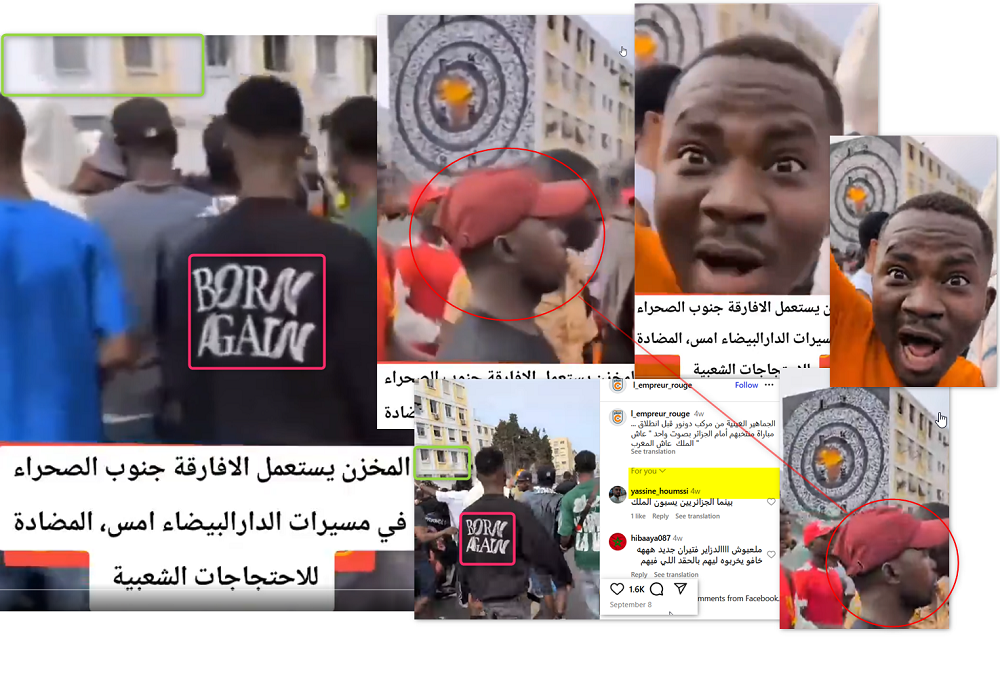
On October 1, 2025, an Algerian account named "Algeria Gate" published misleading news, claiming that the royal family had left Morocco, without citing any official source to confirm this. The same account also published another piece of news claiming that Morocco had lost the right to host the next Africa Cup of Nations, a claim for which we also found no confirmation from official or reliable sources.
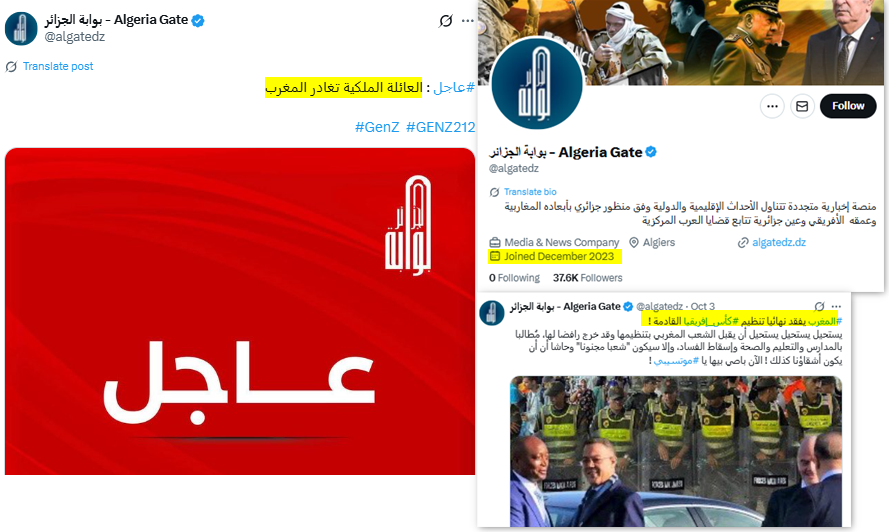
Two opposing narratives spread about the Moroccan protests. Moroccan accounts supporting the ruling regime actively promoted the first narrative, supported by engagement from Saudi accounts. In contrast, Algerian accounts adopted a counter-narrative, attempting to portray the situation in Morocco as heading towards collapse and disintegration. Both sides relied on claims, accusations, and disinformation to promote their narratives.
